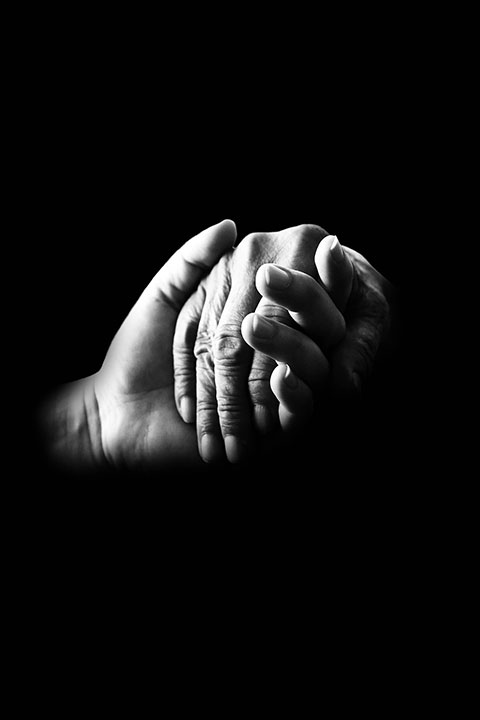For a happy and meaningful life man needs to have the essential quality called empathy. It is a revolutionary force we can have within with which we can bring about fantastic changes in our social life and quality of living; what more it can bring smiles all around. It enables us to feel that we are more like humans and we care.
Whenever I think about empathy an old story comes to my mind. It is all about a lame orphan boy. He was living with a caring foster mother. One day he goes about to buy a puppy with the few coins he got from some kind people. The old lady who was selling the puppies had 4 lovely puppies all looking like wool balls. As soon as the cage was opened, three of them came tumbling out and running fast. Then the boy notices the fourth puppy that came out limping. He had a deformity on his front left leg and was moving with great difficulty. Seeing that the boy’s sparkling eyes were on this lame dog the old woman explained. He has a problem with his leg. You take any one of the other three. They are all lovely puppies indeed. But the boy requested her to give him the one with a problem and goes home with it.
Superb Human Quality
“Too often we underestimate the power of a touch, a smile, a kind word, a listening ear, an honest compliment, or the smallest act of caring, all of which have the potential to turn a life around.” says Buscaglia. Humans who have empathy are with a special ability to absorb like a sponge the hurts, joy and sufferings of his fellow men without actually going through that mental condition themselves. They can feel and keep their hearts closer to someone. It helps to resonate the same feelings. We apply our own mind to explore the likely feelings of someone standing next to us. The boy in the story was suffering the same deformity as that of the dog and therefore it becomes easier for him to understand and to establish a mental connection. “I do not ask the wounded person how he feels, I myself become the wounded person.” says Walt Whitman. Psychologists have been studying for long as to how empathy works in a person.
Contemporary Research Findings
 A mirror neuron is a neuron that fires when an animal acts and when the animal observes the same action performed by another. Thus, the neuron mirrors the behavior of the other, as though the observer himself were acting. In humans, brain activity consistent with that of mirror neurons is located in certain parts of brain.
A mirror neuron is a neuron that fires when an animal acts and when the animal observes the same action performed by another. Thus, the neuron mirrors the behavior of the other, as though the observer himself were acting. In humans, brain activity consistent with that of mirror neurons is located in certain parts of brain.
Neuroscience tells us that mirror neurons are triggered in our own brains when someone else is sad, angry, or happy, and that those mirror neurons help us feel what that other person is feeling. They actually help us feel is what we would have experienced if we were in that person’s place.
It is that sensation where you’re watching someone getting pricked by a needle and you just feel exactly that pricking pain.
A team of Italian researchers thought they found at last the empathy mechanism. Experimenting on monkeys’ brains, they noticed that certain cells activated both when a monkey did while watching another monkey did the same action.
Since that discovery, mirror neurons have been acknowledged as the responsible factor for human empathy. But there were also contrary views that the significance of mirror neurons has been blown out of proportion.
Ramachandran, a distinguished professor of neuroscience calls them “the basis of civilization”. In his opinion it is responsible for this unique human capacity for empathy. When we watch a painful situation, the agony of pain is probably experienced in certain regions of brain. We then experience the same agony, the affective quality of pain. Thus we seem to link up an inexplicable and mysterious connection with another and what is involved in empathy for pain.
Types of Empathy
 There are people who come to tears as they watch a family movie or get sentimental reading a sad story. This can be placed under Affective Empathy. This is the ability to share the emotions of others. They feel others’ pain strongly within themselves when seeing others in pain.
There are people who come to tears as they watch a family movie or get sentimental reading a sad story. This can be placed under Affective Empathy. This is the ability to share the emotions of others. They feel others’ pain strongly within themselves when seeing others in pain.
People with high affective empathy can trigger their own actions to help needy people. They are compassionate and love charity and social service. What more, they can be effective leaders. They listen well. Abraham Lincoln used to say I spent three forth of my time listening to the problems of others and speak only for one fourth of the time.
There is another type of empathy called Cognitive Empathy. They do have the ability to understand the emotions of others but never internalize these feelings. A good example is the sacramental priest who listens and understands the worries and emotions of the confessing person. “To be with another in this empathic manner means that for the time being, you lay aside your own views and values in order to enter into another’s world without prejudice or an emotional involvement. In some sense it means that you lay aside yourself; this can only be done by persons who are secure enough in themselves that they know they will not get lost in what may turn out to be the strange or bizarre world of the other, and that they can comfortably return to their own world at their own sweet wish.
Empathy in Daily Life
 Empathy is the understanding what another person is feeling and what goes through in his mind. It is seeing the world through another’s eyes and standing in that person’s pricking shoes. Alfred Adler calls it “seeing with the eyes of another, listening with the ears of another, and feeling with the heart of another.” Atticus Finch in ‘To Kill a Mockingbird’ describes this still better: “climb inside of his skin and walk around in it.”
Empathy is the understanding what another person is feeling and what goes through in his mind. It is seeing the world through another’s eyes and standing in that person’s pricking shoes. Alfred Adler calls it “seeing with the eyes of another, listening with the ears of another, and feeling with the heart of another.” Atticus Finch in ‘To Kill a Mockingbird’ describes this still better: “climb inside of his skin and walk around in it.”
Empathy is the capacity to come out of the hard tortoise shell in which each one of us is hiding with heads tucked inside. Empathy enables us to lead meaningful life .Without empathy; we are a mere mass of flesh.
Having empathy is a key ingredient to becoming a lovable person and a worthwhile friend. Marshall Rosenberg defines empathy in her unique way as this: “Have you ever been surfing? Imagine you’re on your surfboard now, waiting for the big one to come. Get ready to get carried with that energy. Now, here it comes. That’s empathy. No words – just being with that energy. When I connect with what’s alive in another person, I have feelings similar to when I’m surfing.”
There is an interesting story relating to empathy. Two sick men with terminal sickness were counting their days in a hospital. The one who slept near a window looks out and describes the beautiful scenes: a bird chirping on a tree and blue mountains, to keep his friend happy and enthused. At last when he dies the second man gets transferred to the same bed near the window. But to his utter surprise he could see nothing; only a blank wall and none of the beautiful sights his friend was narrating! A nurse at last reveals the truth that the dead man who did the story telling was actually blind. He was describing the beautiful scenes with his genuine wish to keep his friend happy. He wished that his friend should not lose his hope. “It is an absolute human certainty that no one can know his own beauty or perceive a sense of his own worth until it has been reflected back to him in the mirror of another loving, caring human being.” says Powell
Is Empathy a Weakling’s Game?
 Not in the least it is a sign of weakness. Only a strong willed person good at heart can aspire to have this quality. When you show your sensitivity some around you may take you for a weak personality and a sentimental fool. To be concerned about others is a superb attribute of a true bold man and it is the trademark of a truly alive and compassionate personality. Together we must keep sublime the idea of a real caring, loving and humane world. “Learning to see through their eyes, that’s how peace begins. And it’s up to you to make that happen. Empathy is a quality of character that can change the world.” said Barack Obama.
Not in the least it is a sign of weakness. Only a strong willed person good at heart can aspire to have this quality. When you show your sensitivity some around you may take you for a weak personality and a sentimental fool. To be concerned about others is a superb attribute of a true bold man and it is the trademark of a truly alive and compassionate personality. Together we must keep sublime the idea of a real caring, loving and humane world. “Learning to see through their eyes, that’s how peace begins. And it’s up to you to make that happen. Empathy is a quality of character that can change the world.” said Barack Obama.
“Self-absorption in all its forms kills empathy, let alone compassion. When we focus on ourselves, our world contracts as our problems and preoccupations loom large. But when we focus on others, our world expands. Our own problems drift to the periphery of the mind and so seem smaller, and we increase our capacity for connection – or compassionate action” says the great Daniel Goleman.
Empathy is the capacity to share and reckon the emotions of people. Sympathy is just the feeling of compassion, sorrow, or pity for the hardships of another person, while empathy is directly putting yourself in the shoes of another. So empathy is truly the essence of human relations. It makes you a nobler human, a true friend and a great leader. I would conclude this article with Henri Nouwen’s famous words:
“When we honestly ask ourselves which person in our lives means the most to us, we often find that it is those who, instead of giving advice, solutions, or cures, have chosen rather to share our pain and touch our wounds with a warm and tender hand. The friend who can be silent with us in a moment of despair or confusion, who can stay with us in an hour of grief and bereavement, who can tolerate not knowing, not curing, not healing and face with us the reality of our powerlessness, that is a friend who cares.”
 About the Author:
About the Author:
Jose Vazhuthanapilly, BSc., LLB, DBM, CAIIB Retired in 2008 as AGM from State Bank of India. He had worked as a visiting faculty in the Bank’s Staff Training Centers for 5 years. He is a writer with 20 books to his credit including books on self-help / psychology. He resides in Ernakulam, Kochi. He is active also in social service. He can be contacted at Josevazhuthanapilly@gmail.com
Bestsellers:
- Prasangakarkkulla Kadhakal – St. Paul’s Books, Eranakulam
- EQ – Vyakti Jeevitham Mikavuttathakkam – Sophia Books, Calicut
- Atma Viswasathinte Karuthu Nedam – Sophia Books, Calicut
- Mano Sankharshangale Keezhadakkan Chila Prayogika Margangal – Media House, Calicut
- Vijayam Ningalude Ullil Thanneyanu – Vimala Books
More from Jose Vazhuthanapilly:
- Can you laugh at yourself?
- Will Cultural Ethos Influence Crime?
- Do You Need the Magic Wand of Perfection?
- What Parents Need to Know About Peer Pressure
- Foreseeable Clouds of Divorce
- Laziness and hidden signs of Avolition
- Are Women Better Leaders?
- Resilience: A Ticket For Survival
- What Trauma Does To A Child
- Is Promiscuity A Good Idea?
- A Tool to Gain Emotional Stability
- Laughter Is No Joke, Seriously
- Is Happiness A Country Trait?
- Give The Youth A Dream To Live For
- The Need To Enliven Your Creativity
Image Credits: pixabay.com

Jose Vazhuthanapilly, BSc., LLB, DBM, CAIIB Retired in 2008 as AGM from State Bank of India. He had worked as a visiting faculty in the Bank’s Staff Training Centers for 5 years. He is a writer with 22 books to his credit including books on self-help/ psychology. He resides in Ernakulam, Kochi. He is active also in social service. He can be contacted at josevazhuthanapilly@gmail.com
Bestsellers
- Prasangakarkkulla Kadhakal (St. Paul’s Books, Ernakulam)
- EQ – Vyakti Jeevitham Mikavuttathakkam (Sophia Books, Calicut)
- Atma Viswasathinte Karuthu Nedam (Sophia Books, Calicut)
- Mano Sankharshangale Keezhadakkan Chila Prayogika Margangal (Media House, Calicut)
- Vijayam Ningalude Ullil Thanneyanu (Vimala Books)
- Fulton Sheeninte Jeevitham (Carmel International Publishing House)
- Matti Varakkam Jeevitham ( Jeevan Books)
- Vivaham Kootti Vilakkam (Media House)
Titles in English
- Torrential Bliss-Practical Wisdom for Happy Living-Kindle Books.
- (Articles originally published in Daily Brunch)
- Know your e-kid-A parenting Guide-Kindle Books
- (Articles originally published in Daily Brunch)




















